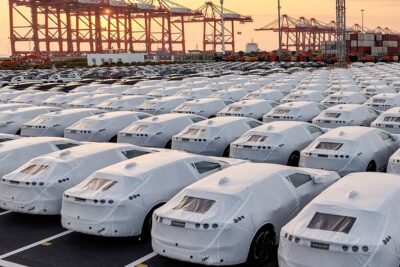EU to demand stricter CO2 standards for new cars
There are signs of a possible further tightening of the EU targets for CO2 emissions from new cars. After the EU Commission had submitted its proposals for this in July 2021, it is now the EU Parliament’s turn – and it has apparently demanded stricter interim targets until 2035.
According to various media reports, Jan Huitema, the parliamentarian from the Netherlands who is responsible for this field, has now presented his proposals to the Parliament’s Environment Committee. The de facto ban on internal combustion engines for new cars from 2035 – officially only cars with CO2 emissions of 0 g/km may be registered then – as demanded by the Commission is to remain, but the interim targets until then are to be further tightened.
As is well known, the EU Commission had proposed that the reduction target in 2030 be set at 55 per cent compared to 2021. Huitema, however, demands a reduction of 75 per cent and further interim targets: By 2025, the saving should be 25 per cent, by 2027 45 per cent. For light commercial vehicles, CO2 emissions are to be reduced by 40 per cent by 2027 and by 70 per cent by 2030 on the way to the 2035 target.
There is no official confirmation of this from the EU Parliament. Huitema confirmed on Twitter, that he has presented his proposals to the EU Parliament’s Environment Committee. His proposal aims to pave a realistic way towards the EU Commissions’ plans for a combustion vehicle exit by 2050. In his words, he aims to set “A clear pathway also needs to be set for further reductions beyond 2030 to contribute to
achieving the climate neutrality objective by 2050.”
The rapporteur’s proposals are not binding, but form the basis for further debate in the European Parliament. The outcome of the debate is open. Criticism of the proposals is already being voiced, for example by Jens Giesecke, the transport policy spokesman of the German political parties CDU and CSU. Huitema had gone beyond what was necessary, Giesecke told the German newspaper Frankfurter Allgemeine Zeitung. “Regardless of all innovation and investment cycles, new fleet targets are proposed.”
In addition, he sees a need for emissions reduction beyond the transport system, which has not been legislated on a European level yet: “In order to achieve a reduction in net greenhouse gas emissions of at least 55 % by 2030 compared to 1990, and to provide a clear pathway towards this target and contribute to necessary emissions reductions before 2030, it is necessary to strengthen the reduction requirements set out in Regulation (EU) 2019/631 of the European Parliament and of the Council25 for both passenger cars and light commercial vehicles.”
“Without ambitious action on greenhouse gas emission reductions in road transport, higher emission reductions would be needed in other sectors, including sectors where decarbonisation is more challenging.” He thus recommends starting a bit earlier: “Against that background, new strengthened CO2 emission reduction targets should be set for both new passenger cars and new light commercial vehicles for the period 2025 onwards.” This is an amendment from a previous proposal aiming for 2030.
In the past, the EU Parliament had tended to favour stricter targets for the car industry. However, the Parliament has to adopt the Commission proposal together with the Council of Ministers, the body of EU states. Some countries had already spoken out against the Commission proposal.
Independent of the political goals for CO2 reduction in transport, further important decisions will be made for the car industry in the coming weeks and months at the EU level: In spring the EU Commission intends to present a concrete proposal for the new Euro 7 exhaust emission regulations, which are to bring stricter specifications for other pollutants such as CO, NOx or particulate matter. In view of the ongoing conversion to electric cars, the VDA criticises the meaningfulness of the Euro 7 standard: extremely high investments are necessary to save “the last per cent of pollutants” – which is no longer worthwhile in view of the coming phase-out of internal combustion engines.
faz.net, autonews.com, bloombergquint.com, twitter.com, europa.eu (amendment proposal as PDF)






0 Comments